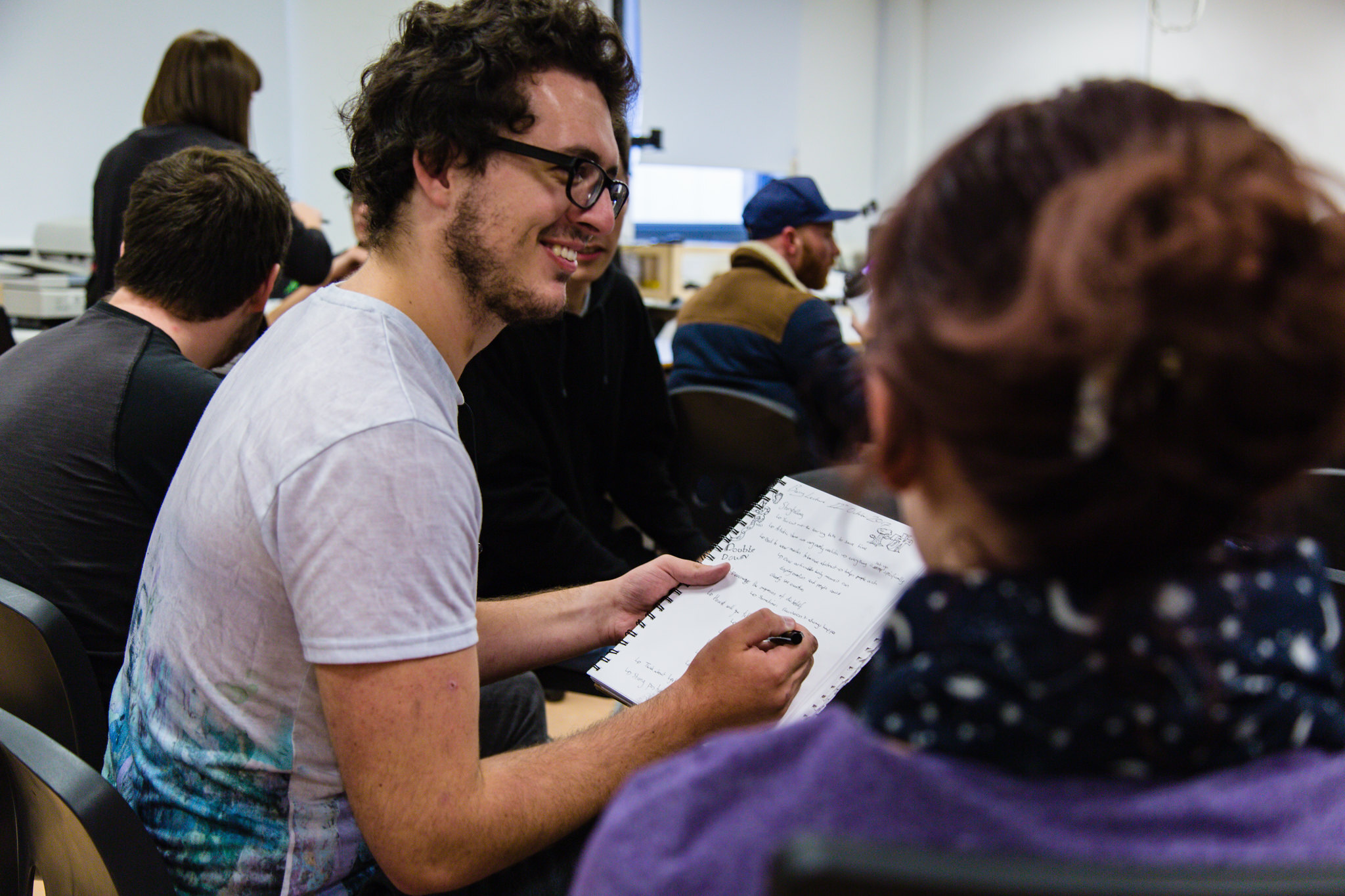iMayflower: The laboratory nurturing the creative minds that can help us all lead more sustainable lives
It is literally a place where great ideas become physical reality.
Where digital technology - 3D printers, laser cutters and world-class scanners, turn simple concepts into something you can feel, touch and be inspired by.
Welcome to Fab Lab Plymouth, a truly innovative ‘digital fabrication laboratory’ in the heart of the city, where designers, makers and creatives can see their visions turn into reality thanks to a suite of remarkable cutting-edge tools.
It’s home to the Smart Citizens Programme, which hosts a range of free events, workshops and training in digital design and fabrication, such as 3D printing and laser cutting.
This is just one of the select locations and programmes in Plymouth where the creative community’s next generation is being nurtured, being given the skills and platform to produce urgent new work that helps us understand our world better.
Fab Lab Plymouth and the Smart Citizens Programme, based at Plymouth College of Art, sits alongside locations such as The Market Hall and Immersive Dome in Devonport and the multiple buildings at the University of Plymouth where extraordinary creative talent is being fostered.
A collaborative network of organisations in Plymouth - joined together for the iMayflower project - is working together to support this upcoming creative community and the stories it has to tell.
And those stories are ever more urgent.

Participants Kerry Brosnan (left) and Vanessa Crosse (right) with their finished solar artworks created at a workshop co-hosted by Smart Citizens and Art and Energy (Photo credit: Smart Citizens Programme)
Creative solutions to global problems
Artists and creatives have always sought to help us understand our world better and inform how we shape it.
But never before has the creative community been needed so much to communicate the drastic change taking place in our natural world, and find innovative new solutions for us to live more sustainably.
In Fab Lab Plymouth, you’ll often find work doing just that by local groups and individuals - such as Art and Energy CIC, a collective of artists, thinkers and makers specifically responding to the climate emergency.
Formed in 2018, Art and Energy worked with 20,000 people in 2021 for the mass participation installation Moths to a Flame, shown at international climate conference COP26. It involved making thousands of moths, live-streamed moth-watching, upcycled craft activities, poetry, an illustrated story book and augmented reality colouring. It was turned into a breathtaking immersive installation at the Immersive Dome for the Illuminate festival, organised by Real Ideas, in 2021.
The remarkable project, an urgent call to action about the climate crisis that touched thousands across the UK, has its roots in iMayflower.
They first connected with Fab Lab Plymouth in 2019, forming the year before and joined by Plymouth College of Art graduate and glass artist Jenny Ayrton. In November 2020 Plymouth Energy Community and Art and Energy CIC launched a campaign with iMayflower partners CrowdFunder to hold free Moths to a Flame creative activities in Plymouth throughout 2021.
Theirs was one of seven within the Plymouth Climate Challenge hosted by Plymouth City Council - raising more than £45,000 - and they also hosted workshops for local people as part of the Smart Citizens Programme, where they learned to create their own sustainable illuminated artworks. During the workshops, participants learned new skills in reverse glass painting, soldering solar cells, computer aided design and laser cutting.
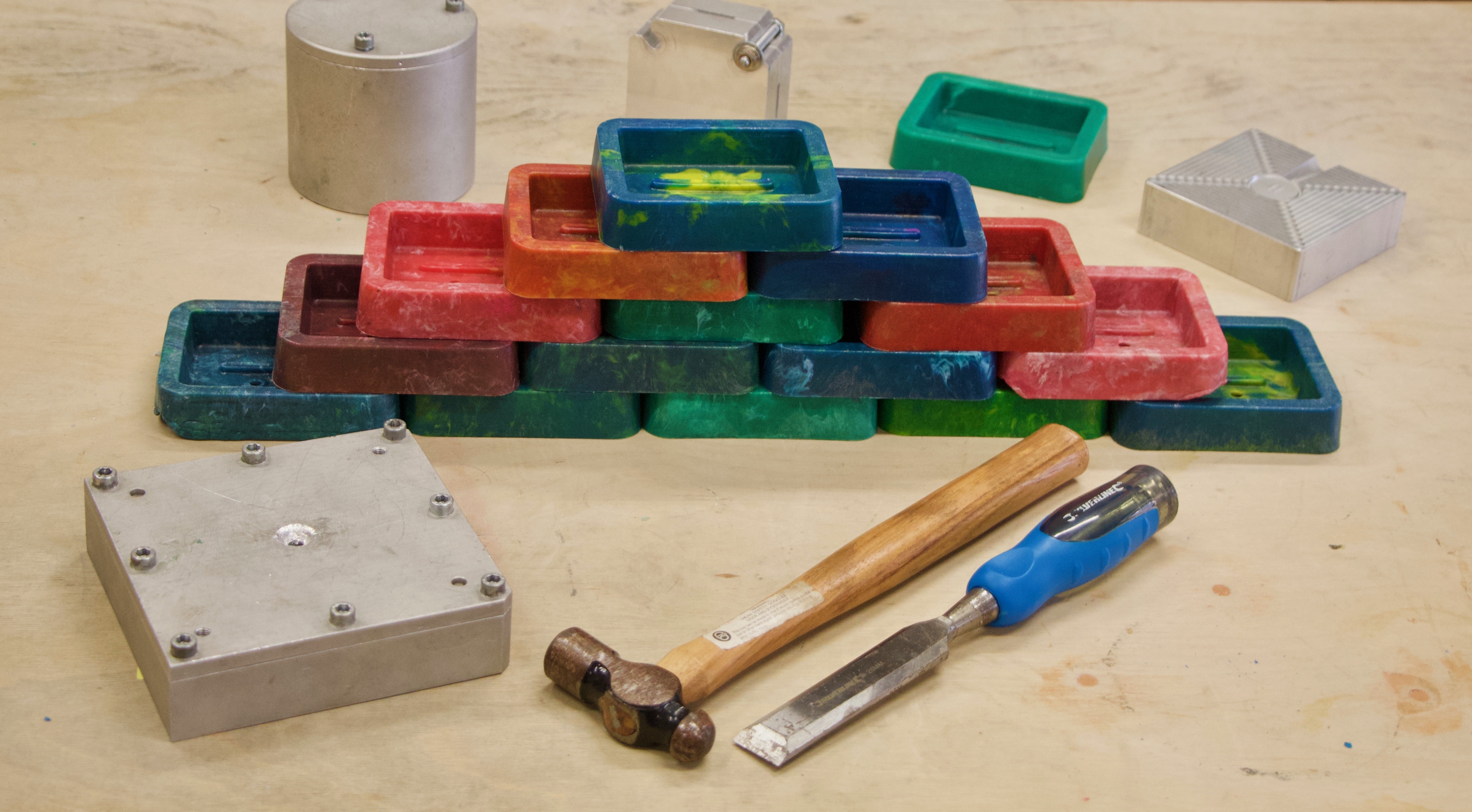
Visitors to Precious Plastic Plymouth hub at the Fab City Plymouth Open Day saw how waste plastic was transformed into soap dishes through injection moulding
Transforming waste plastic into inspiring designs
Art and Energy are just one of an array of groups benefiting from the Fab Lab and Smart Citizens Programme, as well as the network of organisations supporting creatives as part of the iMayflower project.
In 2021, more than 300 local people visited ‘Fab City hubs’ in Plymouth for an open day - led by the Smart Citizens Programme at Fab Lab Plymouth. The Fab City initiative champions local production, circular economies, digital social innovation and global collaboration and its hubs include Digital Fabrication and Immersive Media Laboratories at the University of Plymouth, and The Market Hall in Devonport.
Creative solutions for sustainability was a core focus for the day, and exhibitors included the innovative Precious Plastics Plymouth.
They began working with Plymouth College of Art back in the lockdown summer of 2020, taking part in the Smart Citizens Programme ’s renowned Design & Make training at Fab Lab Plymouth
Now, they’re shredding plastic waste to mould it into new creations, in an inspiring ‘low tech’ way. They take your old plastic and turn it into useful things such as plant pots and buttons - skills they picked up at Fab Lab, where they returned in 2021 to to run a Smart Citizens workshop using CAD to create 3D printing moulds for long-term lasting items such as soap dishes.
They’re working alongside fellow iMayflower partners Real Ideas - the Plymouth-based organisation committed to finding solutions to social change.
They have a space at Real Ideas’ Ocean Studios and have started Real Ideas’ Start Something programme for new enterprises. They’re also working with the University of Plymouth to recruit students as volunteers and collaborate with staff, while their successful Crowdfunder - another iMayflower partner - has seen them raise £20,000 to upgrade their equipment and reach new communities.
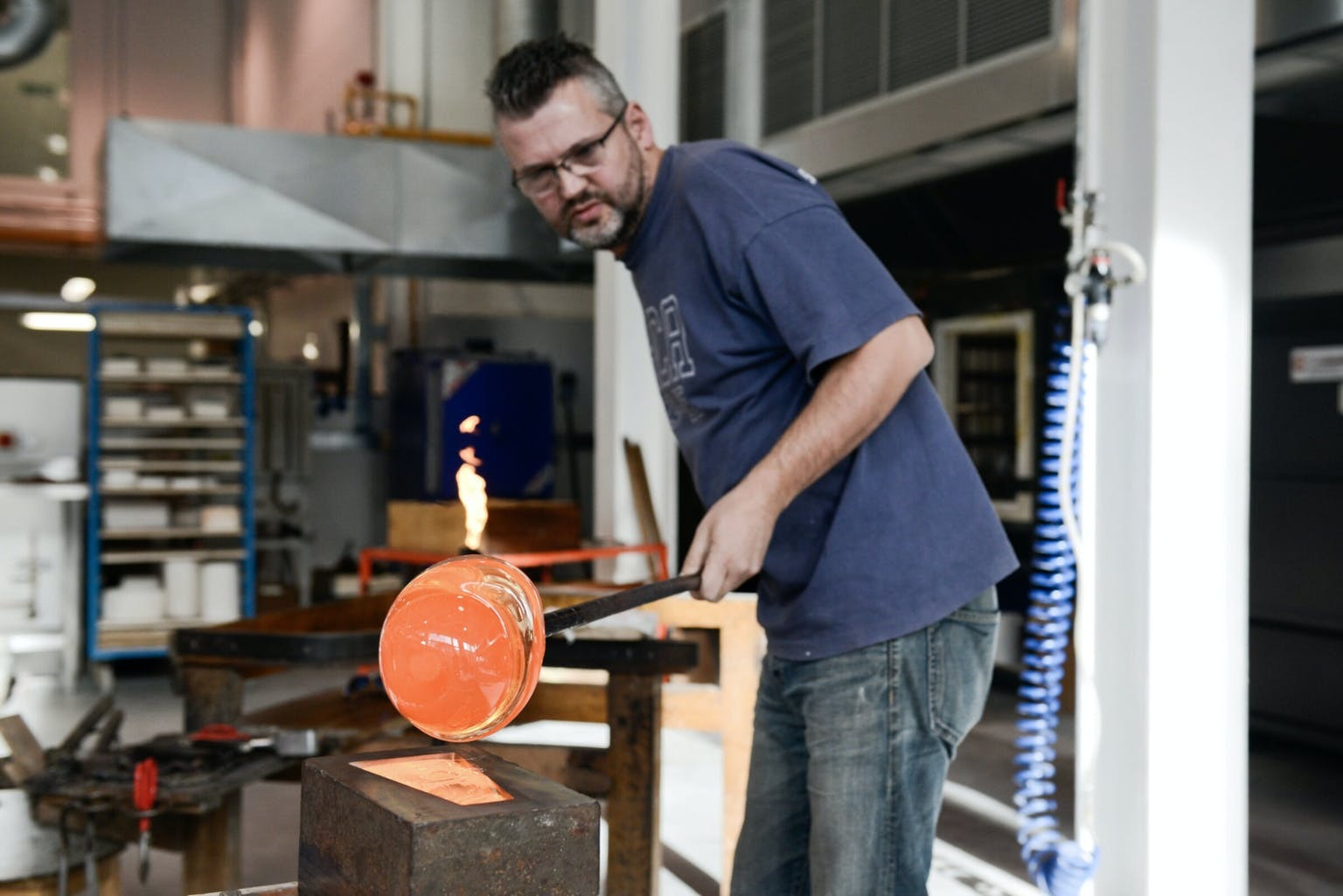
Ian Hankey blows glass at Plymouth College of Art
The sustainable glassblowing revolution
The extraordinary array of equipment at Fab Lab Plymouth has given businesses, individuals and organisations the opportunity to literally ‘make’ their visions. But without the right people to train them, these great ideas of tomorrow would still be sat in the concept stage.
Step forward the Fab Lab team, including Principal Technician and Smart Citizens tutor Ian Hankey, who embodies its sustainable ethos and collaborative vision.
After initially leaving school with no qualifications due to undiagnosed dyslexia, Ian has since developed world-leading expertise in glass, including working in the glass industry for over 40 years, from his first apprenticeship at Pilkington Glass and later managing the hot glass workshop at the Royal College of Art and managing Teign Valley Glass Studios, to his work to establish in 2014 and subsequently manage Fab Lab Plymouth at Plymouth College of Art.
Ian is also the brains behind the Upcycled Glass Company, who collect waste glass that often cannot be recycled and turn it into handmade art and design products.
They use a mixture of new technologies, modern farming methods and historical glass mixing processes that go back to the 17th century from their farm in Dartmeet on Dartmoor.
So far £10,000 has been raised via a Crowdfunder, with £5,000 more awarded by Devon Climate Challenge to create the sustainable glass blowing workshop on the moors.
Alongside his work with glass, Ian has developed his own skills in the Fab Lab, learning specific and advanced CAD CAM processes, and researching historical glassmaking processes.
Ian said: “Whether we like it or not, we’re living through a climate emergency. Everything I’ve seen and done in my life points to the fact that for every environmental problem that we solve, someone with money is going to come along and try to use that solution to create more money for themselves, undermining the positive change that could have benefited society.
“The only way to tackle societal problems of sustainability is to change the framework we’re working in and find new ways to work together. The Upcycled Glass Company CIC is my attempt to bring into the world one small part of the change that we need to live in a more sustainable way.”
The enormous challenge of raising our society’s sustainable standards and overcoming the climate crisis is overwhelming. But if a supported creative community can show us solutions founded in spaces where innovation is fostered, we stand a much better chance.
Find out more about Fab Lab Plymouth here and the iMayflower project to nurture a creative digital city here.
This activity is part of the iMayflower project and has been supported by The Department for Digital, Culture, Media and Sport, who fund the Cultural Development Fund, which is administered by Arts Council England. iMayflower is led by Plymouth City Council and delivered in partnership with Creative England, Crowdfunder, Destination Plymouth, Plymouth College of Art, the Real Ideas Organisation and University of Plymouth.
Lee Nutbean has always been concerned by how sustainable we are as a city, a society and a planet.
At his core, he believes that we are consuming too much. We’re taking too much from our environment but not giving enough back.
The Smart Citizens Programme helps people in Plymouth understand that balance. It helps people measure our impact on the world around us - such as air quality, noise pollution, humidity levels and CO2 levels.
For Lee, being part of the programme based in Fab Lab Plymouth at Plymouth College of Art has been life-changing.
He became one of the first to use the Smart Citizen Kit, which gives participants the power to measure the world around them and use the data to better understand and seek solutions to environmental issues.
“We’re in a period of excessive consumption,” he explains. “We’re consuming more than what we're replenishing.
“The Smart Citizen Programme, the Smart Citizen Kit, has allowed people to do participatory sensing - taking responsibility for collecting data in your own environment. And that can be shared on a cloud system for other people to use.”
The Smart Citizen Kits were first developed as an open-source project by Fab Lab Barcelona, a digital fabrication ‘laboratory’ much like Fab Lab Plymouth - part of a network of more than 1,000 Fab Labs worldwide. They are filled with cutting-edge 2D and 3D design software and machinery that fuels innovative digital design.
The data gathered by local citizens around the world is shared with the global Smart Citizen network, helping us better understand how our world is changing.
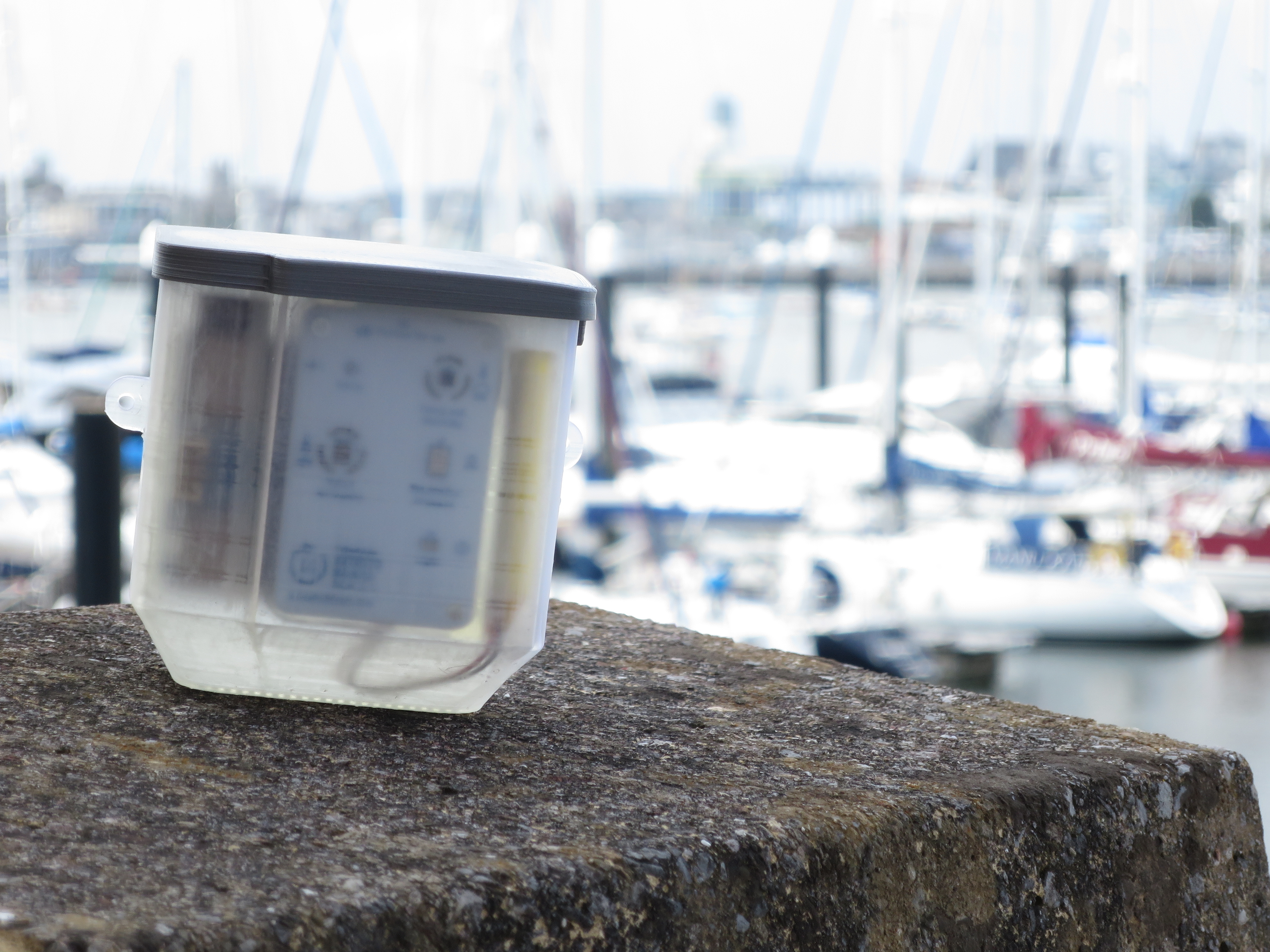
Smart Citizen Kit sensor created by Gareth Evans (Photo credit - Gareth Evans)
Lee, a local electronics expert from Plymouth, has embraced the kit, leading six weeks of training at Fab Lab Plymouth and developing an online platform that represents the environment in Plymouth (such as sky, sun, clouds, rain, hills) using data from the sensors installed around the city by local people who took part in the training.
The result is breathtaking, and was displayed as an immersive experience at the Immersive Dome during the Full Dome festival at The Market Hall in Devonport in October 2021.
He said: “I looked at the kit and thought it was amazing. It's just user-friendly, there’s no programming involved. It was a real breath of fresh air to see something that the average citizen can use.
“If you look at the weather report for Plymouth on BBC News, at the bottom, it'll tell you the GPS of where a sensor kit is. And it's Jennycliff. So we've got one kit, that's at Jennycliff. And that one piece of kit is now giving us the air quality and weather conditions for the whole of Plymouth.
“You're humanising, socialising and visualising their data at a more participative level.”
The Smart Citizens activity has been made possible by the iMayflower project in Plymouth - which aims to build Plymouth's Creative Industries and nurture creative people power across the city.
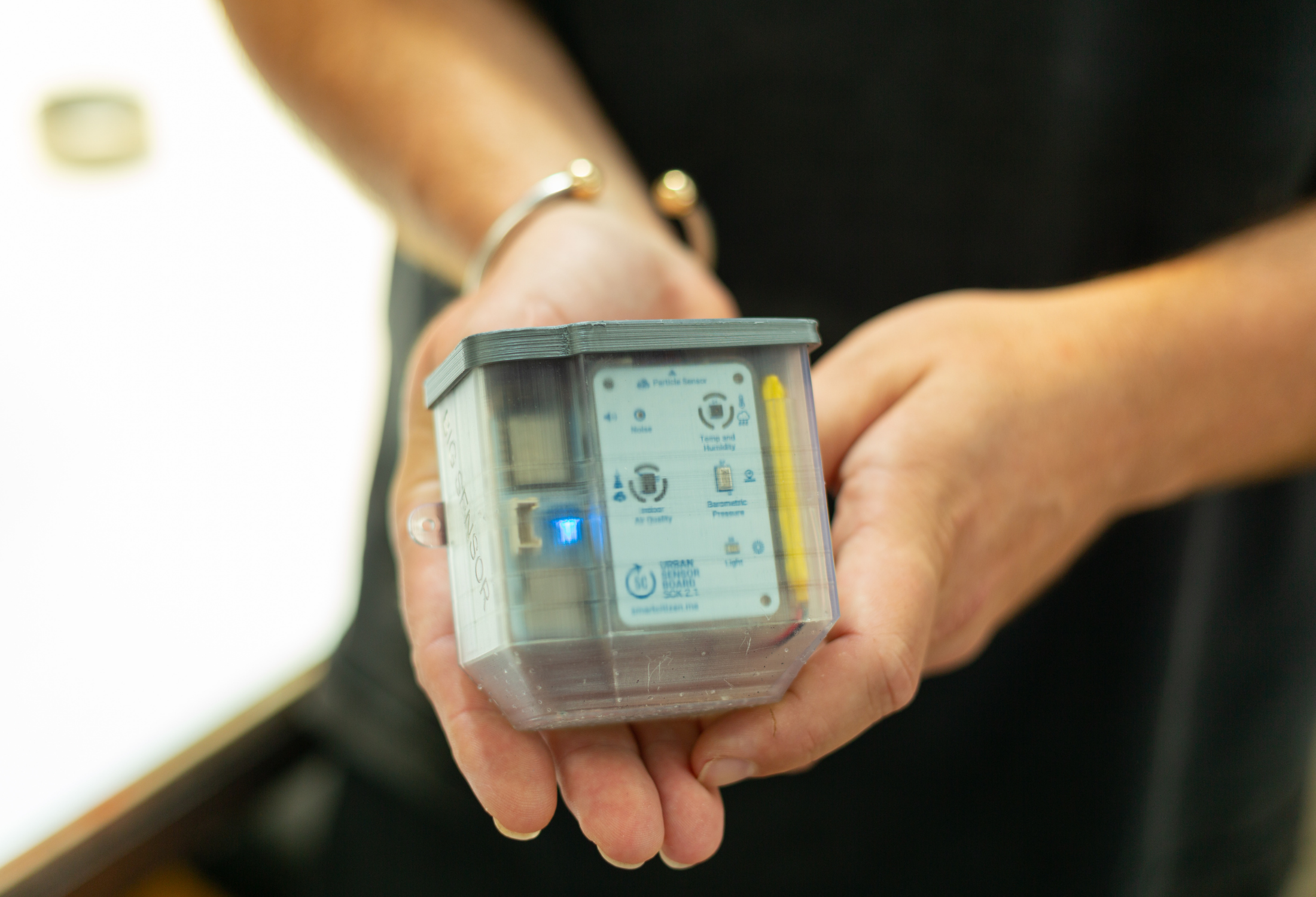
Image credit: Ray Goodwin
Gareth Evans is one of the city’s new creatives and a local Smart Citizen who took part in the programme.
“I thought it was really interesting to be involved in a course that would allow us to install multiple weather monitoring kits and environment monitoring kits around a city.
“This data can then be used to look at what's going on in different parts of the city and possibly influence what's going on with policy making in the city.
“Following on from the Smart Citizens training course, I was able to join a subsequent course at the Fab Lab. This allowed me to develop the case for the kit that we were supplied during the first course and design and build my own.
“It taught me skills with 3D design and 3D printing and taking a design all the way through from concept to the final constructed item - and then mounting the kit on the wall at home, knowing it's in my own case.”

(Left) Local participant Gary Hannaford and his Smart Citizen Kit (Photo credit - Ray Goodwin)
(Right) Gary Hannaford demonstrates how data from his sensor is shared on the international Smart Citizen online platform (Photo credit - Ray Goodwin)
Local maker, Gary Hannaford, is a keen supporter of the Smart Citizens Programme. He created his own sensor in the six-week Smart Citizen Fab City Kit course.
He said: “I followed my father into toolmaking but left the trade due to medical problems. It is a trade I miss deeply and probably what drives me towards being a maker. The Smart Citizens Programme has been a godsend for me. It has fueled my desire to make and given me the tools to do so.
“The Smart Citizen Kit training has been great; I am inspired to delve into this world a little deeper now I understand it better.
“I loved assembling the environmental sensor and enjoyed being involved with Lee’s artwork that uses its data. This boosted my Arduino knowledge, which before the Smart Citizens Programme was limited to making a GPS Speedo to someone else’s design.
“Having a Smart Citizen sensor at my home that publishes data for others to use is brilliant. I check the outputs frequently to monitor what’s happening around me and I’m even considering expanding the station and adding a weather-monitoring system to run alongside the environmental monitor.”
The Smart Citizens Programme’s six-week training not only provided an opportunity to develop electronics and coding skills but supported participants to understand how these skills could be combined with digital fabrication to create smart objects with real-world impacts, such as environmental monitoring.
Through the Smart Citizens’ training Noa Bailey, aged 12, took his first steps into the world of electronics and coding. Noa said “I really enjoyed the course and learnt so much, including coding and processing script, electronics and 3D printing.
“It was amazing to produce something that can monitor the environment around it and create a digital landscape that shows this. I can’t wait to do the next Smart Citizens course and develop my skills in coding and electronics.”
This activity is part of the iMayflower project and has been supported by The Department for Digital, Culture, Media and Sport, who fund the Cultural Development Fund, which is administered by Arts Council England. iMayflower is led by Plymouth City Council and delivered in partnership with Creative England, Crowdfunder, Destination Plymouth, Plymouth College of Art, the Real Ideas Organisation and University of Plymouth.
This May the award-winning IGNITE Festival of Creativity launches their free Business Programme, open to students and graduates from Plymouth College of Art and University of Plymouth. This hands-on programme will support participants to develop key enterprise skills and gain the confidence to grow their creative businesses after graduation.
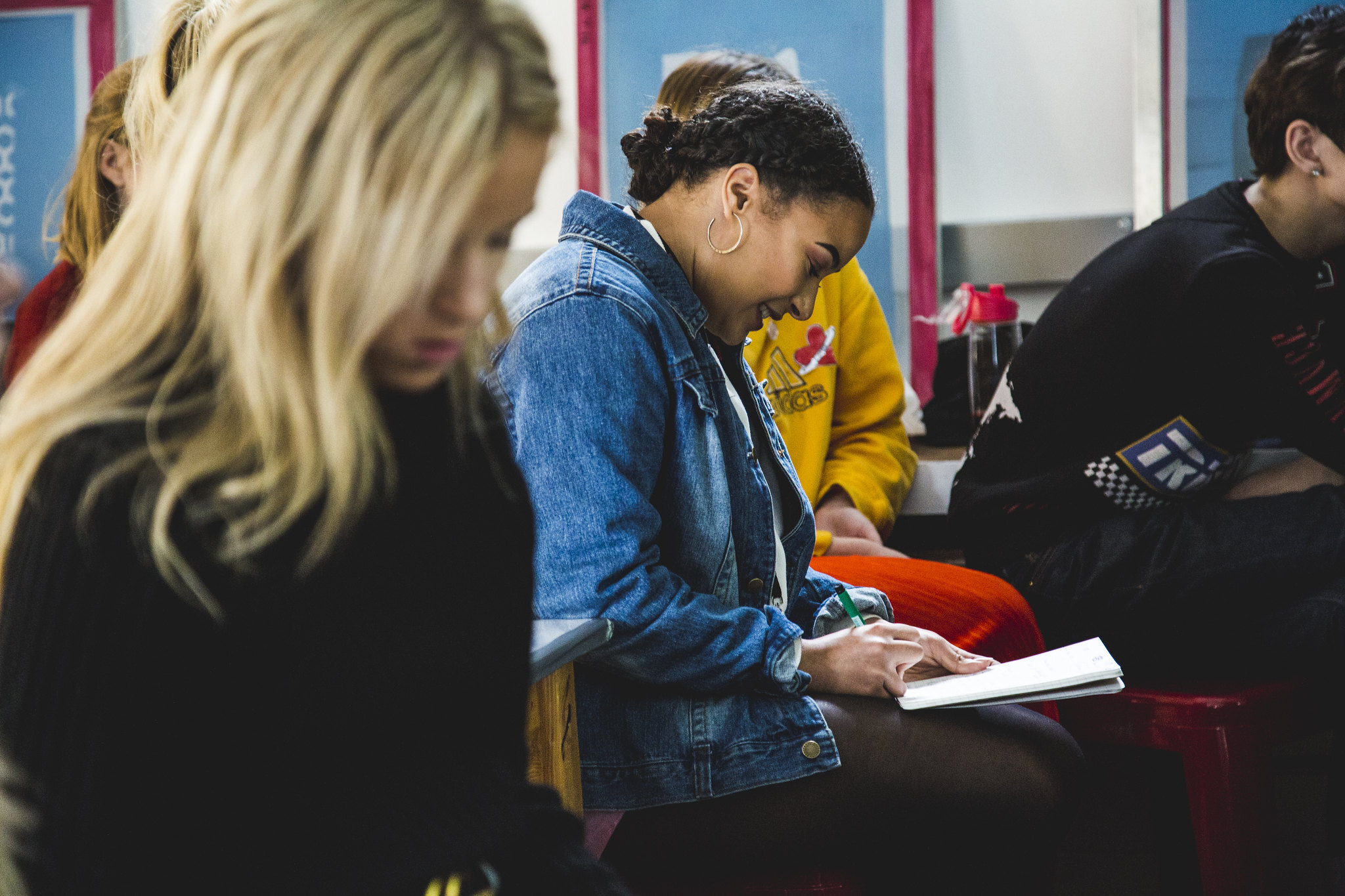
Plymouth students are set to kickstart their businesses at the IGNITE Business Programme. Image Credit: Plymouth College of Art
Eight evening workshops will be delivered by Mark Cotton, an independent business development consultant, founder of Mark Cotton Consultancy, and Non-executive Director and Trustee of KARST, Plymouth’s largest independent contemporary arts space. Including business planning, digital marketing, customer insight, and pitching, workshops will equip participants with the practical skills to pursue their business ambitions and prepare their products or ideas for market. Students and graduates with existing business will also benefit from best practice in how to grow or diversify their business, as well as mentoring opportunities.
Running from 23 May to 1 June 2022, places must be booked online in advance on Eventbrite, where details are also available for how students from other Plymouth-based educational institutions can apply to join.
Now in its fourth year, the IGNITE Festival of Creativity celebrates the work of hundreds of creative graduates from over 30 of Plymouth College of Art and University of Plymouth’s degree programmes across a series of exhibitions and events across multiple city-wide venues, including galleries, studios and event spaces.
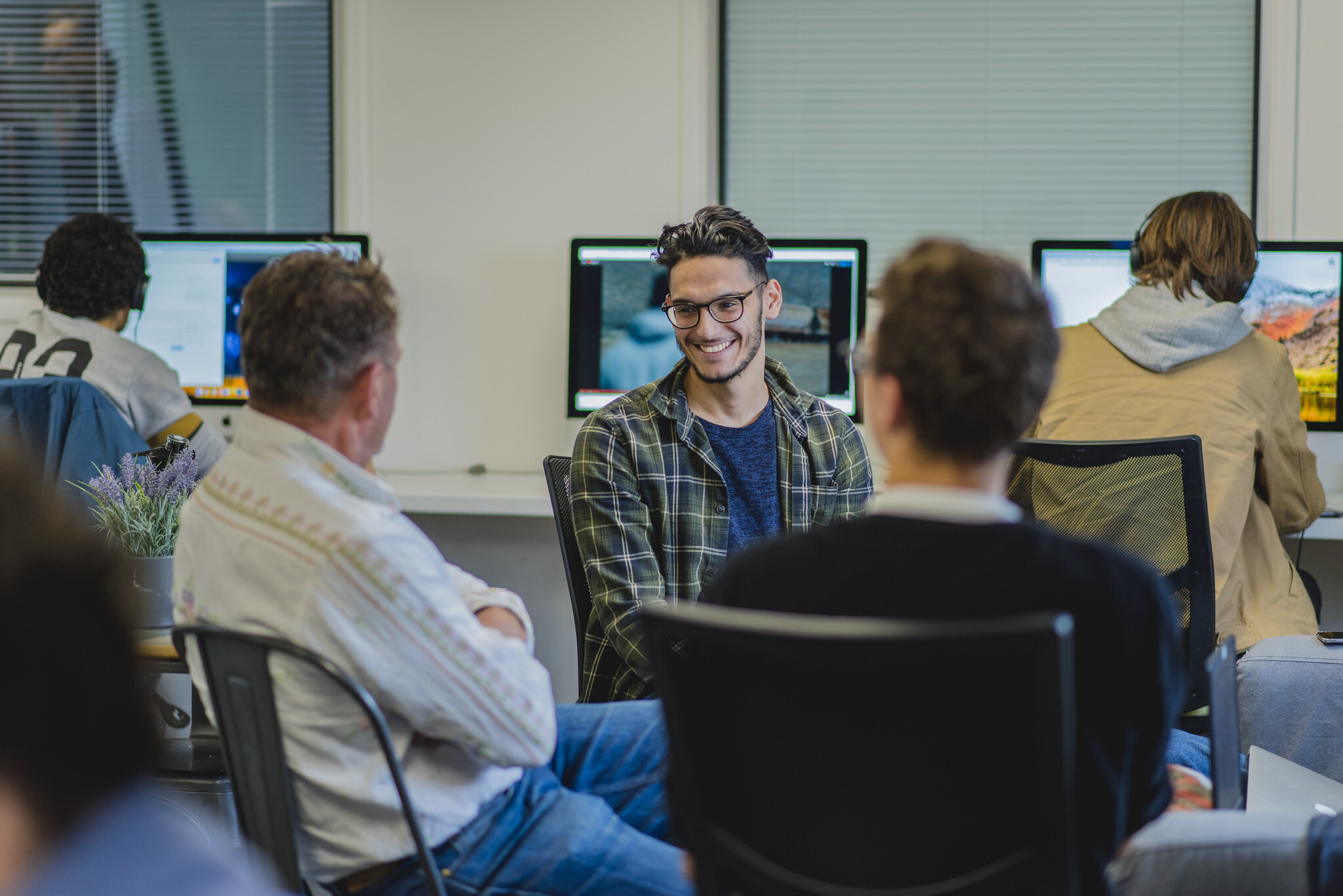
Students can benefit from mentoring opportunities at the IGNITE Business Programme. Image Credit: Plymouth College of Art
Peter Barker, Head of Plymouth College of Art’s School of Design + Communication, said: “The IGNITE Festival, which has been running since 2019, has been a boost to graduate profile building and employability. Plymouth College of Art students have benefitted from the Ignite Futures talent promotion website, from exhibition and promotional opportunities around the city of Plymouth and from participation in business facing seminars and training sessions."
IGNITE is supported by Plymouth City Council as part of the iMayflower project, and by The Department for Digital, Culture, Media and Sport, who fund the Cultural Development Fund (administered by Arts Council England).
